WASHINGTON, D.C. -- Many students in the U.S. have entrepreneurial aspirations and energy that could help drive future job creation in the country. Nearly 8 in 10 students (77%) in grades 5 through 12 say they want to be their own boss, 45% say they plan to start their own business, and 42% say they will invent something that changes the world.
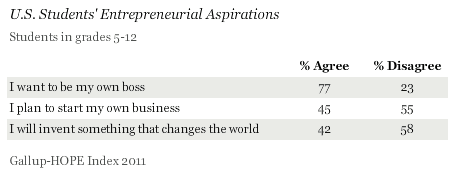
The findings are from a nationally representative Gallup Student Poll conducted May 17-June 4, 2011, with 1,721 students in grades 5 through 12, and are released in partnership with Operation HOPE. The entrepreneurship and financial literacy items discussed in this article make up the Gallup-HOPE Index.
The majority of students also demonstrate persistence and are willing to assume risk -- both of which are qualities typically characteristic of entrepreneurs. Most students say they are not afraid to take risks, even if failure is a possibility (91%), that their mind never stops (91%), and that they never give up (85%).
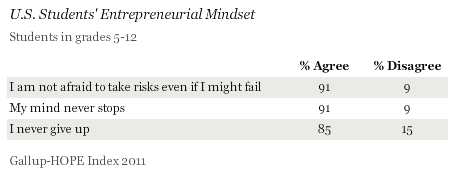
Business and Finance Education Lacking
Despite their energy and ambitions, the Gallup-HOPE Index findings suggest many students are not getting the education and work experience they need to help achieve their goals. While 87% agree that the more education they get, the more money they will make, far fewer report getting the type of practical knowledge and experiences that will be useful once they are in the workforce.
Less than 6 in 10 students (58%) say they have a bank or credit union account with money in it, and just over half (54%) agree their school teaches them about money and banking. Half of students (50%) say their school offers classes in how to start and run a business.
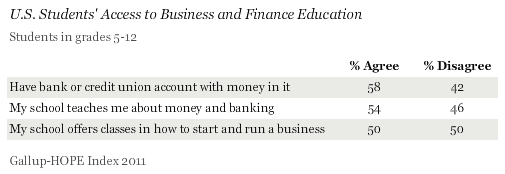
Students in grades five through eight (89%) are more likely than high school students (84%) to agree that the more education they get, the more money they will make.
Older Students Have Greater Access to Business and Finance Education
Students in grades 9 through 12 (64%) were more likely than students in grades 5 through 8 (37%) to agree that their school offers classes in how to start and run a business. High school students (60%) were also more likely than fifth- through eighth-graders (54%) to say they have a bank account with money in it. High school students were somewhat more likely (56%) than younger students (51%) to say their school teaches them about money and banking.

Few Students Getting Practical Experience
Additionally, very few students are getting any practical work experience. While 33% say their parents or guardians have started a business, 5% say they are currently interning with a local business, and 4% say they run their own business now. The percentage of high school students engaging in these activities was not significantly higher than younger students.
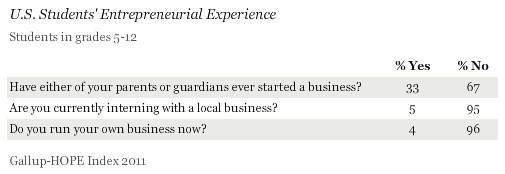
About one in five students in grades 5 through 12 said they worked for one hour or more at a paying job in the last week. High school students were slightly more likely than younger students to say they worked for one hour or more at a paying job.
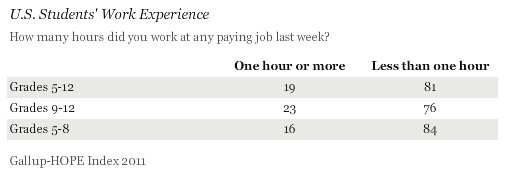
Implications
Like U.S. adults, the Gallup-HOPE Index data suggest an important segment of the American student population demonstrates attitudes often ascribed to entrepreneurs. Previous Gallup research documents the notion that students may possess good ideas about the future. At the same time, focused efforts to transform these aspirations into reality are not as strong as they could be.
Given the slow pace of the U.S. economic recovery and persistent unemployment and underemployment rates, developing the entrepreneurial attitudes and experience of young people is critical to helping them grow up to be productive workers who ultimately help to create jobs. Continued measurement and understanding of these attitudes can also help to inform strategies for building a pipeline of business builders who will help their local communities thrive in the future.
Survey Methods
Results for this student poll are based on telephone interviews with 1,721 students nationally in grades 5 through 12. Interviews were conducted after 4:00 p.m. Tuesday through Saturday from May 17 through June 4, 2011.
The Gallup-Healthways Well-Being Index (GHWI) is a national telephone survey conducted nightly with 1,000 randomly sampled adults. It uses a dual-frame design to include both landline and cellular telephones. Respondents are asked permission to be re-contacted. The GHWI samples are weighted by gender, age, race, Hispanic ethnicity, education, region, adults in the household, and phone status (cell phone only/landline only/both, cell phone mostly, and having an unlisted landline number). Demographic weighting targets are based on the March 2010 Current Population Survey figures for the aged 18 and older non-institutionalized population living in U.S. telephone households. All reported margins of sampling error include the computed design effects for weighting and sample design.
The GHWI includes a question asking whether the respondent has children and if so, the year in school of the child. The weighted subset of households with parents of school-aged children in grades 5 through 12 who granted permission to be re-contacted served as the sampling frame for this study. These respondents were then called by telephone to ask permission to interview their children.
For results based on the total sample of national students, one can say with 95% confidence that the maximum margin of sampling error is ±3 percentage points.
In addition to sampling error, question wording and practical difficulties in conducting surveys can introduce error or bias into the findings of public opinion polls.
For more details on Gallup's polling methodology, visit https://www.gallup.com/.
